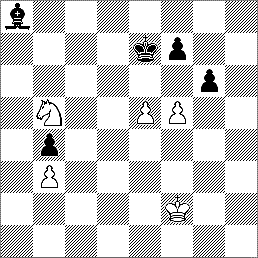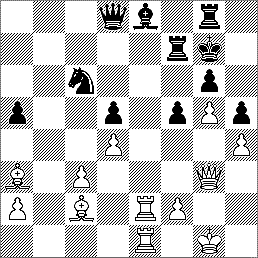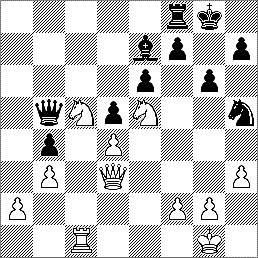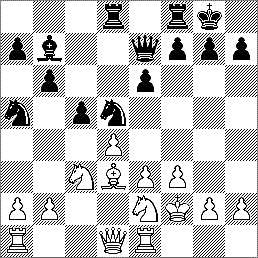LETTER FROM THE LODZ GHETTO:
A Tribute to Dawid Daniuszewski
by Tomasz Lissowski
|
|
| Though little known, Dawid Daniuszewski’s
biography
and chess achievements are deserving of remembrance. Daniuszewski
(1885?-1944?), who spent most of his life in Lodz (located in central
Poland),
was a practical player weaker than both Rubinstein and Tartakower.
He was, to be perfectly frank, weaker than a number of forgotten Polish
players such as Przepiorka, Regedzinski, Paulin Frydman, and Makarczyk,
whose best years were in the first decades of the twentieth
century.
I believe it important to recall that Daniuszewski had the best score
against
Alekhine among Polish players (1½-½). He
participated
in the first individual Chess Olympiad in Paris 1925, and played in a
number
of Polish team, and individual, championships. |
| It would be interesting to research the part of
his life spent in the Soviet Union (1915-1921), where he played in what
was the first de facto Soviet Chess Championship held in Moscow in
1920.
A tournament won by Alekhine with a score of 12 out of 15, with
Romanowski
finishing second, a point behind. Daniuszewski finished ninth,
scoring
7-8. |
| Daniuszewski also compiled two chess books.
The first, a great rarity nowadays, was entitled The First Almanac of
the Lodz Society of Chess Playing Amateurs (Lodz 1907, in Russian,
co-author: A. Mund). Over thirty years later, Daniuszewski’s
second
and final book appeared, The Jubilee Book of the Lodz Society of
Chess
Playing Amateurs (Lodz 1938). He edited a chess column in a
Lodz
newspaper and contributed to Polish and Russian chess magazines, the
latter
until 1915. |
| Originally I had hoped to locate people who in
their
youth were familiar with Daniuszewski, ones who had met him at the
chessboard.
That hope proved impossible as Makarczyk, Wroblewski, and Gadalinski, to
name just a few, had already passed away. They were too modest or
perhaps too introverted (a feature very popular among chess players, and
the bane of their biographers) to write down their memoirs, detailing
names,
events, facts and impressions. And they were not lucky enough to
meet an inquisitive chronicler, one capable of asking the right
questions
to help preserve such eyewitness accounts of chess history. |
| Recently, by chance, an unusual item came into my
hands. During a phone conversation with Zygmunt Lokuciewski, an older
Lodz
chess player who was born in Vilnius during the twenties, I happened to
mention Daniuszewski’s name. Lokuciewski said: “Well,
personally
I can say little about him, but I think there is something in my book
collection.
I will write you.” |
| I soon received a letter, in which my
correspondent
wrote as follows: |
| Please find enclosed a copy of one page. You will
find on it a game D. Daniuszewski - Dr. S. Szapiro, played in the Lodz
ghetto on February 9, 1944. The page had been inserted on the
last,
blank page of a chess annual, seemingly from 1937. My discovering
it was purely by accident. I have no more evidence concerning D.
Daniuszewski. |
|
With regards,____________
|
|
Z. Lokuciewski
|
|
| Here is the page sent to me by Zygmunt
Lokuciewski: |
|
|
| At the top appear descriptions to several
positions.
The first, according to Kasparian (Domination in 2545 Endgame
Studies,
Moscow 1974, page 13) is a study by E. Post from 1939. |
 |
| White wins: 1.Nc7 Bh1 2.Kg1! B~ 3.f6+ K~
4.e6
and wins. |
|
|
Manuscript
(Courtesy of Zygmunt Lokuciewski)
|
|
|
Daniuszewski,D — Gelenstern,J [?]
|
|
| 1941.09.14 |
POL Litzmannstadt (Ghetto)
|
|
 |
| 1...f4? 2.Re6! fxg3? 3.Rg6+ Kh8 4.Rh6+
Kg7 5.Rh7# 1-0. |
|
|
Manuscript
(Courtesy of Zygmunt Lokuciewski)
|
|
| The next position was taken from Richter’s
column
in the German contemporary, the Neue Illustrierte Zeitung. |
 |
|
|
Manuscript
(Courtesy of Zygmunt Lokuciewski)
|
|
 |
|
|
Manuscript
(Courtesy of Zygmunt Lokuciewski)
|
|
| The gamescore, with annotations written in
Polish,
is at the bottom. |
|
Daniuszewski,D — Szapiro,S
|
|
| C17/06 |
French: Advance Winawer (Bogolubov)
|
|
| 1944.02.09 |
POL Litzmannstadt (Ghetto)
|
|
Annotations by Dawid Daniuszewski
1.e4 e6 2.d4 d5 3.Nc3 Bb4 4.e5 c5 5.Bd2 cxd4 6.Nb5 Bc5
7.Nf3 Qb6 8.b4 Be7 9.a3 Nc6 10.Bf4 a5 11.bxa5 Rxa5?
12.Rb1 Qd8 13.Rb3 Bc5 14.Bd3 Nge7 15.0-0 h6
16.Nd6+ Bxd6 17.exd6 Ng8?
18.Bb5 Bd7 19.Nxd4 Nf6 20.Rg3
| ** |
Winning the queen by 20.Bxc6 bxc6 21.Nxc6 Bxc6 22.Rb8
is too costly. |
20...Kf8 21.Bxc6 bxc6 22.Be5 Ra4 23.Qa1 Ne8?
| ** |
Even without this mistake Black’s position
remains difficult. |
24.Bxg7+ Nxg7 25.Nxe6+!
| ** |
Weak is 25.Rxg7? for then 25...Qf6! but not 25...Kxg7?
because of 26.Nxe6+! |
25...Bxe6 26.Qxg7+ Ke8 27.Qxh8+ Kd7 28.Qxh6 Kxd6 29.Rb1
Qa5 30.Qf8+ 1-0.
| ** |
Manuscript
(Courtesy of Zygmunt Lokuciewski)
|
|
| After playing over Dawid Daniuszewski’s last
games
I started to wonder if I should publish them. The Second World War
was finished more than half a century ago. Perhaps enough of
martyrdom?
Perhaps it would be better to leave such matters in silence? I
posed
such questions to one of my friends, and received a reply which I direct
to the reader’s attention, as it helped me form my opinion: |
| My own view is that such historical matters in
chess
are invaluable. [...] |
| I think the games and the story surrounding them
are a very important matter. The struggle to preserve culture, to
continue with the matters of the mind that make us truly human, and not
mere animals, in the face of the Nazi beast strikes me as true
courage.
Just the act of writing down the scores suggests an effort to preserve
something valuable in the face of such utter horror and destruction that
is ennobling, in itself. I, for one, would be proud to play over
the game scores, if you care to share them. I think they would
make
a valuable human interest story. [...] |
| You may be holding in your hands one of the last
cultural artifacts ever to emerge from among that suffering group of
humanity.
The recording of those games was an act of affirmation of life, of what
makes life good and beautiful, in my estimation. Sure, the games
themselves might not be great chess, but that is not the point.
They
are candles lighting the darkness, if only for a moment, if only in a
small
way - and as such, I believe, entitled to more consideration than merely
the merits of the play itself. |
|
| I could hardly express it more profoundly.
Let us preserve in our memory Dawid Daniuszewski, who, as a man and
chess
player, was formed in Lodz, on the borderline of Polish, Jewish, Russian
and German culture, and whose life was tragically cut short during the
extermination of those in the Lodz ghetto. |
| Footnote |
| Lodz: A city in central Poland, and a large center of
commerce and textile industry, referred to in the nineteenth century as
the “Polish Manchester”. Before 1939 Lodz had less than
one million
inhabitants, with a large share (approximately 30% each) of Germanic and
Jewish people. In 1940 Lodz (later renamed Litzmannstadt) and
Poznan,
along with the surrounding area, were joined directly to the German
Reich
as “Wartheland”. Numerous Polish inhabitants were
deported to the
so-called General Government in Warsaw, Cracow, Lublin, etc.
Jewish
inhabitants were enclosed in a selected part of each city (ghetto) where
a huge forced labor camp was organized in which only one in a thousand
survived. The details and precise date of Dawid
Daniuszewski’s death,
as well as thousands of others, remains unknown. |
|
© Tomasz Lissowski 1999
|
| Errata (Added 1999.05.10) |
| Mr. Lokuciewski’s surname is ZYGMUNT, not
Zbigniew.
I wrote in a hurry. Could you correct it? Sorry and thanks.
T. L. [No Problem - N. P.] |
